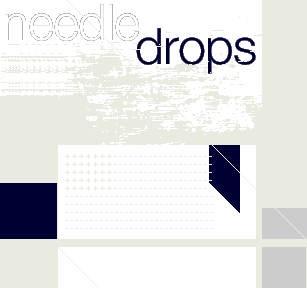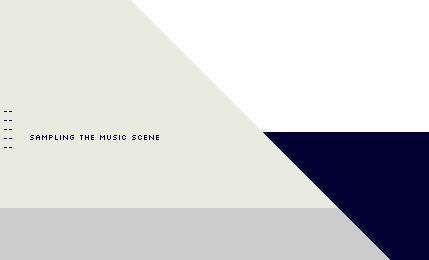


++ Contact Philip Sherburne ++
++ Recently ++
Tuesday, November 29, 2005 = The Stooges Unearthed (Again)
Tuesday, November 8, 2005 = Documenting Beulah And DCFC
Tuesday, November 1, 2005 = Out-Of-Control Rock 'N' Roll Is Alive And Well
Tuesday, October 25, 2005 = Just In Time For Halloween
Monday, October 3, 2005 = The Dandyesque Raunch Of Louis XI
Monday, August 15, 2005 = The Empire Blues
Tuesday, August 9, 2005 = David Howie's Sónar Diary
Monday, July 25, 2005 = Hot Sounds For Summertime
Monday, June 27, 2005 = Overcoming Writer's Block At Sónar 2005
Monday, June 4, 2005 = Cool New Sounds To Download Or Stream
++ Needle Drops Archives ++
View full list of Needle Drops articles...
|
|
 |
Friday, August 24, 2001
++ Victor Davies + New Order + AMM + more
++ All the fetishization of the newest software and the heaviest hardware that goes on in electronic music makes it easy to lose sight of the power of simple machines like the guitar — and the voice. Victor Davies' self-titled debut is appearing soon on Germany's nu-jazz imprint JCR/Jazzanova Compost Records, normally known for punchy funk and offbeat house. This album, however, is straight acoustic soul, awash in strummed guitar, bright percussion, and stabs of horns and Rhodes piano. Davies' voice swoops effortlessly from smoky valleys to sun-kissed peaks; it sounds like he's studied not only Bill Withers but Nick Drake. The record's similar in spirit to the recent compilation Folky, which featured Davies alongside brooding brethren such as Zero 7, and provides the perfect antidote to laptop overdose. Is there a new movement afoot?
++ For many music fans who grew up in the early 1980s, New Order's was among the first "electronic" music they'd heard. Sure, it was still rock, but the synthetic textures and quantized rhythms seduced precisely because they heralded a distinctly futuristic music, a quantum leap from the rough humanism of Joy Division and their contemporaries. New Order's downcast roboticism marked a clean break from the guitar jangle that so much punk and post-punk was turning into. (If you don't believe me, just listen to "Video 5-8-6," recorded for the opening of the Hacienda Club in 1982 and released on Touch in 1997 — the slinky electro-funk hints at techno's grace, like an teenaged athlete just beginning to grow into his elongated limbs.) Now, to promote the October 16 release of Get Ready, their first album of original material in eight years, the band is offering up "Crystal," the album's first single, to fans-cum-bedroom-remixers. From August 27 to September 24, listeners who visit www.acidplanet.com may download Sonic Foundry's free ACID Xpress mixing software, along with loop packs for "Crystal" 's component parts, and have their way with the song. (It's also a good chance for an initial assessment: was it really worth the wait?). Would-be Martin Hannetts and burgeoning Arthur Bakers can submit their remixes to Sonic Foundry's Web site; the winning entry will be posted on New Order's official site and, reportedly, submitted to the band to be considered for a future release. Sure, sounds farfetched, but if Kid606, born 1979 — only a year before Depeche Mode formed — could end up remixing that band in 2001, who knows?
++ The albums of legendary improvising group AMM "are as alike or unalike as trees," as their label Matchless Recordings puts it. I'm no expert on their history, but I suspect it's true: formed in 1965, the group epitomizes flux. Their lineup (currently a trio composed of Keith Rowe, John Tilbury and Eddie Prévost) has included numerous players and collaborators, among them Cornelius Cardew, Lol Coxhill and Jim O'Rourke. Their ensemble improv floats in the nether region between jazz, rock, electronic music and the "experimental" tradition of Cage. But if that rather daunting reputation has kept you from digging into the group's extensive catalog, Tunes Without Measure or End provides an excellent introduction. Recorded in Glasgow at Evan Parker's free radiCCAls Festival in May 2000, the hour-long disc features an unhurried meander into the edges of sound. The trio play piano, guitar, percussion and electronics, blending contemplative chords, atonal string work, rhino snorts of static, and percussive lines so fluid they make Autechre's most untethered rhythms sound goose-steppingly rigid.
++ More noise! Always a sucker for luscious packaging, I treated myself the other day to Werner Dafeldecker and Boris D. Hegenbart's Eis 9, which leered seductively at me from the racks at San Francisco's Aquarius Records. I didn't know a damned thing about it, aside from recognizing Dafeldecker's name from an obscure 1998 collaboration with Fennesz, Jim O'Rourke, Kevin Drumm, Martin Siewert and Christof Kurzmann, and from Polwechsel's two albums of brilliant free improv on the hat[now]Art label (saxophones, guitar, cello, guitar, double bass, more guitars and electronics — could there be a more heavenly combination?). In any case, Eis 9's cover design looked like Emigre magazine on acid, so how could I resist? Happily, the disc is as stunning as its packaging, if not nearly as frenetic as the cover's orange and gray explosions of Dingbats would lead you to expect. Utilizing percussion, guitars, sampler, "devices" and the wonderfully ambiguous "electronic" (sic), the duo instigate a conversation between heat and gravity, wave and particle, Velcro and glass. Music like this is ultimately about nothing more — or less — than listening itself: every scratch, twiddle and wheeze matters, at once offhand and dead serious. In an age of commodified sound and endless exchange, where any tone is as good as the next, free improv teaches you to listen for particularity. "Yeah, but anyone could do it!" the naysayers will proclaim, aghast at the scrapes and gazzongs that pass for a musical language. Exactly. And moreover, "anyone" didn't do it; only these two, and they only did it once, so listen up and listen good, because what you'll hear is the fragile, whimsical beauty of the aleatory, whipping past your head and away into the cosmos, where it's got a date with chaos.
GROB, the label responsible, meant nothing to me, but digging through my stack of unlistened-to CDs (I know, I know, rough life) I chanced across another release on the label, a collaboration of Lionel Marchetti, Voice Crack and Jèrôme Noetinger, whose insectile shimmer of microphones, speakers, tape recorder and "cracked everyday-electronics" proved just as intriguing and weirdly beautiful. Clearly this GROB was in touch with a universe I'd never glimpsed, so I checked out the Web site, www.churchofgrob.com, and found them linked in spirit to the same DIY philosophy I've always held dear. Noting the international network of labels releasing music that would never find an outlet in the dominant channels of the Culture Industry, the Cologne-based label announces its intention "to support and publish this kind of Improvised Music that is not submitted to the well known clishés [sic] of post-serialism, free jazz and free rock but that come up with different perspectives and different insights about commerciality and zeitgeist-compatibility. GROB — like many other labels and editors — want to unveil the productivity of a scene which is in fact too diverse to be called a scene." From the two discs I've had the pleasure of hearing, the unveiling seems to be well under way. I suggest grabbing gobs of GROB and grokking them at your earliest convenience.
++ British hip-hop has always gotten short shrift from U.S. heads, but finally there comes definitive proof that American MCs don't necessarily have the last word. Roots Manuva, known for runnin' t'ings 'round South London ever since he dropped 1999's Brand New Second Hand and lent his buttery, island-inflected drawl to tracks for Leftfield, Mr. Scruff, 23 Skiddoo and Pharoahe Monch, returns on September 18 with Run Come Save Me. The record, released by Ninja Tune's hip-hop sublabel Big Dada, veers from string-heavy soul to bleepy, jerky funk, with more than a little reggae influence thrown into the mix. As North American hip-hop becomes increasingly homogenized, it's refreshing to see how artists abroad are continuing to develop the hybrid language of the Black Atlantic.
|
| |
|